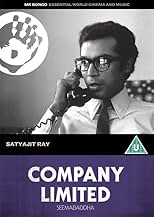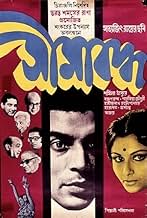IMDb RATING
7.8/10
1.5K
YOUR RATING
Chatterji is an ambitious and self-made young man who becomes the director of the company he works for.Chatterji is an ambitious and self-made young man who becomes the director of the company he works for.Chatterji is an ambitious and self-made young man who becomes the director of the company he works for.
- Director
- Writers
- Stars
- Awards
- 2 wins total
- Director
- Writers
- All cast & crew
- Production, box office & more at IMDbPro
7.81.4K
1
2
3
4
5
6
7
8
9
10
Featured reviews
Keeping up appearances
The budget may be low (an explosion is simulated, for example, merely by shaking the camera), but Satyajit Ray's film about climbing the corporate ladder in early 1970s India is a highly sophisticated piece of work. It takes place in a surprisingly modern, gleaming slice of Calcutta; but the environment in which the emerging Indian professional classes prosper still bears the residual echoes of the colonial era. The central character, played skillfully by Barun Chanda , is quiet and charming, and superficially ambiguous about the appearances his position requires him to maintain; a little too flirtatious, perhaps, especially with his sister-in-law (who plays the movie's moral conscience); but when it comes down to it, ruthless in his ambition: I found his mixed motivations wholly convincing. There are even echoes of 'Save the Tiger' in the plot, except whereas that film (from the same era) is about the decline of America, this one is set against the backdrop of a rising India. An interesting and farsighted film, 'Company Limited' catches a snapshot of a country in transition from the era of empire and Gandhi to that of today.
Limits Stretched Already!
Smart's a misnomer in offices of social wherewithal keeping records on paper for another day at heroism buttressed by inks on winks and dinks off kinks to keep the smarts smart in contexts declared historical for modernity beating in their cusps. The cusp of edges are depressions in vessels of hegemony challenged to survive in time like calendars do with companies and banks marketing raison détres of yore as choices hard chore brooked not with narratives parading as cultural artefacts peculiarly regional but with professional elan on dark schmooze keeping paperwork for distant fans air conditioning for the last man standing, deliberately, for lack of choices in any further professional manoeuvres at offices taken by those that call dibs on files and folders alien to smart cut trouser hems and locals to kitty parties without a regional licence in turn.
"Written by Shankar, another novelist with a deeper cut cult following"
This the the next one, but it tells a story of a very rich, successful young man and the credibility of his acts and decisions from the perspective of his sister in law, who believes him and admires too. Written by Shankar, another novelist with a deeper cut cult following, everything is undercurrent in this film. Extramarital affairs, lobbyism, corporate corruption, flirting and even communism. The recurring thing you will see here is the doubt of a suburban girl, who is empathetic about the underground naxalites, between good and bad about the corporate sectors in the then growing third world country. For the people who always needs a well known reference, a lot of scenes in this movie is like 'American Psycho'. And you will get a significant role of Ms. Shefali, just not a cameo.
Good movie but not a masterpiece
This is a good movie, but not one of Ray's best. The acting is pretty good by the main leads and it has a good story; however it loses something in the execution. The direction does not involve the audience and keeps them at a distance.
Its the story of the rapid rise of an educated and street smart person, up the corporate ladder of a successful Britain-based multinational company; and his experience in that position. This is juxtaposed with his personal life. The film concentrates most of its running time with the character's family.
The movie starts with a prologue which provides us with an information overload and forces us to pay attention from the very first minute. This information is essential as the entire movie revolves around it. However the story does not lose anything if people are unable to grasp all the information thrown at them within the first 5 minutes. The story flows smoothly however a key element in the story is not made clear which makes the ending seem pretty melodramatic which it isn't and had this element been conveyed properly, the end would make complete sense. Nevertheless, the Angel DVD's summary of the film clarifies this aspect which is unfortunate and shows a lack of direction from Ray.
This movie should be considered as supplementary to the other and much better Ray films: Jana Aranya (The Middleman) and Mahanagar (The Big City) which also deal with the corporate world and its effect on people's personal lives.
In the end the movie does not leave us very impressed, but hard core Ray fans will watch it anyways. Five stars for a good story, cinematography and the acting.
Its the story of the rapid rise of an educated and street smart person, up the corporate ladder of a successful Britain-based multinational company; and his experience in that position. This is juxtaposed with his personal life. The film concentrates most of its running time with the character's family.
The movie starts with a prologue which provides us with an information overload and forces us to pay attention from the very first minute. This information is essential as the entire movie revolves around it. However the story does not lose anything if people are unable to grasp all the information thrown at them within the first 5 minutes. The story flows smoothly however a key element in the story is not made clear which makes the ending seem pretty melodramatic which it isn't and had this element been conveyed properly, the end would make complete sense. Nevertheless, the Angel DVD's summary of the film clarifies this aspect which is unfortunate and shows a lack of direction from Ray.
This movie should be considered as supplementary to the other and much better Ray films: Jana Aranya (The Middleman) and Mahanagar (The Big City) which also deal with the corporate world and its effect on people's personal lives.
In the end the movie does not leave us very impressed, but hard core Ray fans will watch it anyways. Five stars for a good story, cinematography and the acting.
Satyajit Ray shows the fatal world of corporate business where the alternate meaning of success is self desolation.
Seemabaddha / Company Limited (1971) :
Brief Review -
Satyajit Ray shows the fatal world of corporate business where the alternate meaning of success is self desolation. Seemabaddha is brilliant take on politics and propoganda run by business minded tycoons who care about nothing but their own benefit. Satyajit Ray uses a common man with high ambitions to showcase the change appeared in humans because of corporate race. The best part I liked is that he doesn't use highly greedy character like we assume, rather he makes protagonist look like a normal guy who wants get promoted for his own hard work and dedication. The films deal with the rapid modernization of Calcutta, rising corporate culture and greed, and the futility of the rat race which is worth watching even for today's era. In early 70s it must have created a rage as the nation was struggling to make everything simple for Middle class people. Seemabaddha is about Shyamal Chatterji, a hard-working and genius employee who wants to become a director of the company he works for. His general ambitious turns into obsession and then how things changes for him is all you get to see here. Barun Chanda in lead role is simply amazing. He had couple of fumbles which can be overlooked, otherwise he's just flawless rest of the time. Sharmila Tagore plays a girl who doesn't have much to say but her expressions says a lot. In supporting roles, Paromita, Harindranath and others are comfortably good. Well, Seemabaddha isn't that perfect, it definitely has couple of issues like Shyamal & Tutul's bonding and screenwriter wasting some potential scenes. Nevertheless, Satyajit Ray still makes a solid drama in his own club. Overall, it's Very Nice. Unlike other Satyajit Ray movies this one isn't Classic but very close to it.
RATING - 7/10*
By - #samthebestest.
Satyajit Ray shows the fatal world of corporate business where the alternate meaning of success is self desolation. Seemabaddha is brilliant take on politics and propoganda run by business minded tycoons who care about nothing but their own benefit. Satyajit Ray uses a common man with high ambitions to showcase the change appeared in humans because of corporate race. The best part I liked is that he doesn't use highly greedy character like we assume, rather he makes protagonist look like a normal guy who wants get promoted for his own hard work and dedication. The films deal with the rapid modernization of Calcutta, rising corporate culture and greed, and the futility of the rat race which is worth watching even for today's era. In early 70s it must have created a rage as the nation was struggling to make everything simple for Middle class people. Seemabaddha is about Shyamal Chatterji, a hard-working and genius employee who wants to become a director of the company he works for. His general ambitious turns into obsession and then how things changes for him is all you get to see here. Barun Chanda in lead role is simply amazing. He had couple of fumbles which can be overlooked, otherwise he's just flawless rest of the time. Sharmila Tagore plays a girl who doesn't have much to say but her expressions says a lot. In supporting roles, Paromita, Harindranath and others are comfortably good. Well, Seemabaddha isn't that perfect, it definitely has couple of issues like Shyamal & Tutul's bonding and screenwriter wasting some potential scenes. Nevertheless, Satyajit Ray still makes a solid drama in his own club. Overall, it's Very Nice. Unlike other Satyajit Ray movies this one isn't Classic but very close to it.
RATING - 7/10*
By - #samthebestest.
Did you know
- TriviaOne of the films of the Calcutta Trilogy, the others being The Adversary (1970) and The Middleman (1975).
Details
- Release date
- Country of origin
- Official site
- Language
- Also known as
- Beschränkt
- Filming locations
- See more company credits at IMDbPro
- Runtime
- 1h 50m(110 min)
Contribute to this page
Suggest an edit or add missing content



























